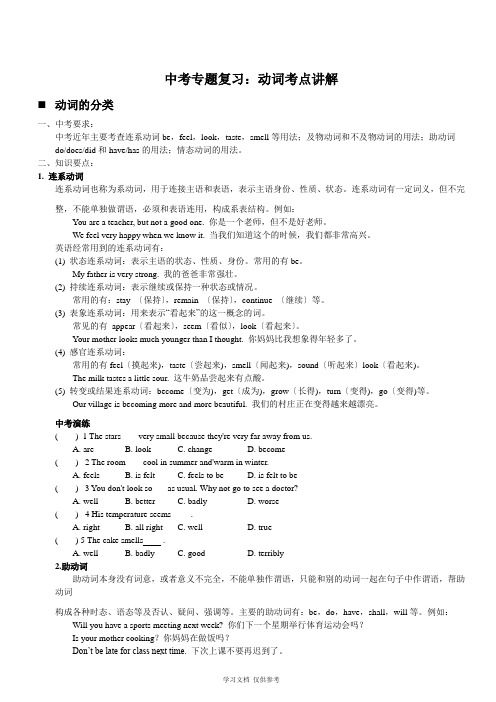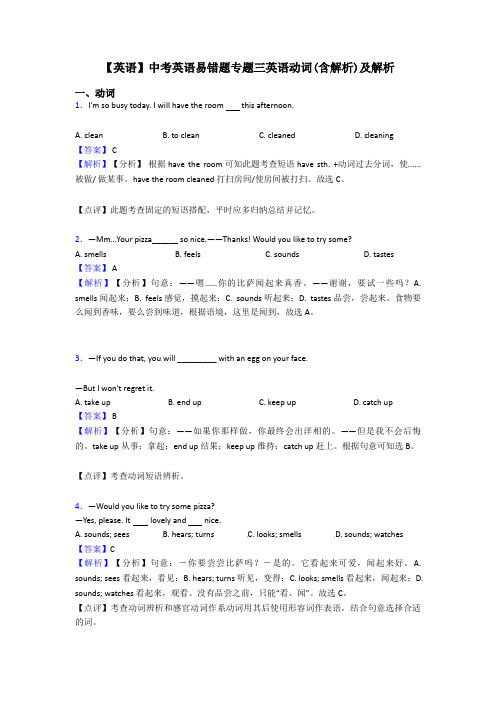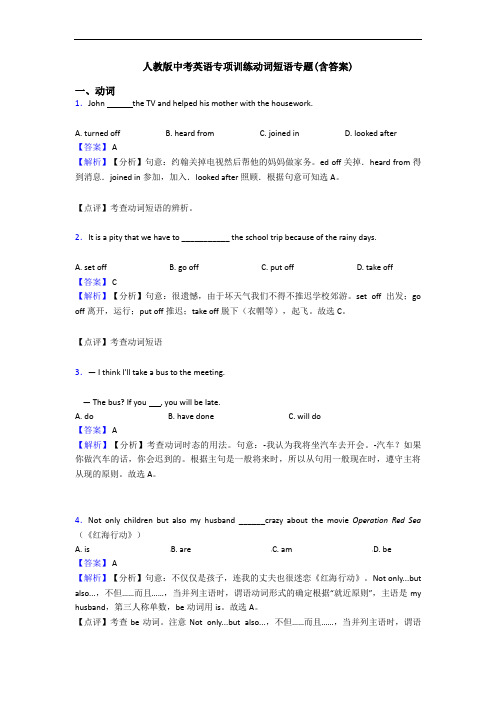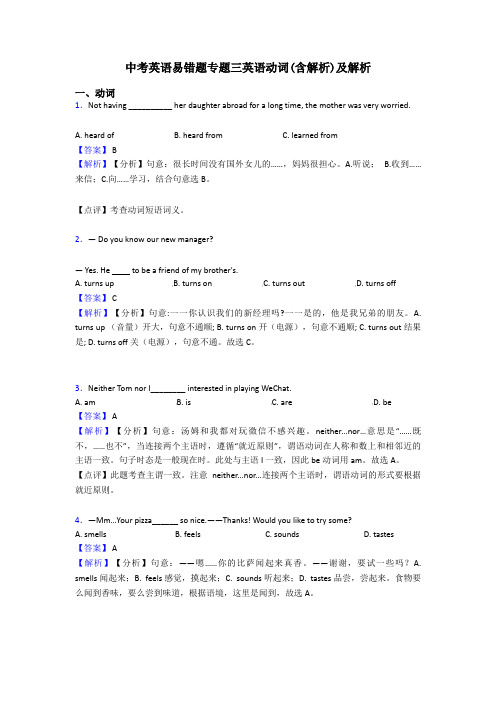中考英语动词专题
中考英语总复习专题九动词及动词短语课件

⑥in短语 arrive in 到达
call in 拜访
believe in 信任;信赖 hand in 交上;提交;呈 送 join in 参加(=take part
或沮丧
write down 写下;记 下
in)
⑦off短语
keep off 避开;让开 clean…off 把……擦掉
⑧about短语 think about 考虑 care about 关心;在意 talk about 谈论;讨论;议论 worry about 担心;烦恼
take in 吸入;吞入(体内)
飞
take off 脱下(衣服等);起
take up 从事(工作、兴趣爱好等);着手处理
⑥turn短语 turn on 打开 turn off 关掉 turn out 结果是
turn up 调高(声音)
turn over 翻身;翻转 turn down 调低(声音) turn around 转身;调头
调查
⑬of短语 hear of 听说 think of 思考;考虑
⑭over短语
fall over 绊倒
⑮to短语 belong to 属于
listen to 听……
stick to 坚持;固守 talk to 跟……说 add…to 把……加到……上 lead to 导致;通向
lend…to… 借……给……
put down 记下;镇压
put into 把……放进;使进入 put on 穿上(戴上);上演;增加(体重) put up 张贴(广告等);搭建;举起
②look短语 look at 看 look for 寻找
look after 照顾
look through 浏览 look up 查找;查询 look around 向四周看
中考英语动词基本形式题20套(带答案)

中考英语动词基本形式题20套(带答案)一、动词基本形式1.When I see people rubbish everywhere, I am often very angry.A. setB. throwC. makeD. take 【答案】 B【解析】【分析】throw rubbish everywhere“到处扔垃圾”,throw“扔”,符合句意。
故选B。
句意是:当我看到人们到处扔垃圾时,我会很生气。
【点评】本题考查动词的词义辨析。
2.As parents, you should pay more attention to your words, because sometimes they will ________ your child`s schoolwork.A. influenceB. improveC. increaseD. require 【答案】 A【解析】【分析】句意:作为父母,你应该更多得注意你的话,因为有时候它们会影响你的孩子的功课。
A. 影响,B. 提高,C. 增长,D. 需要,根据句意可知答案,故选A。
【点评】考查动词辨析。
熟记这些动词。
3.Edison ________ the light bulb and Columbus ________ America.A. discovered; discoveredB. invented; discoveredC. invented; inventedD. discovered; invented【答案】 B【解析】【分析】句意:爱迪生发明了灯泡,哥伦布发现了美洲。
“发明”为invent,主要指发明世界上原本不存在的东西;“发现”discover,表示发现客观上已存在的事物。
故选B。
【点评】本题考查动词辨析,注意理解选项意思,理解句意。
4.— So many problems! I'm too tired.— You should try ________ them by yourself.A. get overB. to get offC. getting overD. getting off【答案】 C【解析】【分析】句意:“那么多问题,我太累了。
中考英语专题复习:动词考点讲解

中考专题复习:动词考点讲解动词的分类一、中考要求:中考近年主要考查连系动词be,feel,look,taste,smell等用法;及物动词和不及物动词的用法;助动词do/does/did和have/has的用法;情态动词的用法。
二、知识要点:1. 连系动词连系动词也称为系动词,用于连接主语和表语,表示主语身份、性质、状态。
连系动词有一定词义,但不完整,不能单独做谓语,必须和表语连用,构成系表结构。
例如:You are a teacher, but not a good one. 你是一个老师,但不是好老师。
We feel very happy when we know it. 当我们知道这个的时候,我们都非常高兴。
英语经常用到的连系动词有:(1) 状态连系动词:表示主语的状态、性质、身份。
常用的有be。
My father is very strong. 我的爸爸非常强壮。
(2) 持续连系动词:表示继续或保持一种状态或情况。
常用的有:stay 〔保持〕,remain 〔保持〕,continue 〔继续〕等。
(3) 表象连系动词:用来表示“看起来”的这一概念的词。
常见的有appear〔看起来〕,seem〔看似〕,look〔看起来〕。
Your mother looks much younger than I thought. 你妈妈比我想象得年轻多了。
(4) 感官连系动词:常用的有feel〔摸起来),taste〔尝起来),smell〔闻起来),sound〔听起来〕look〔看起来)。
The milk tastes a little sour. 这牛奶品尝起来有点酸。
(5) 转变或结果连系动词:become〔变为),get〔成为),grow〔长得),turn〔变得),go〔变得)等。
Our village is becoming more and more beautiful. 我们的村庄正在变得越来越漂亮。
【英语】中考英语易错题专题三英语动词(含解析)及解析

【英语】中考英语易错题专题三英语动词(含解析)及解析一、动词1.I'm so busy today. I will have the room this afternoon.A. cleanB. to cleanC. cleanedD. cleaning【答案】 C【解析】【分析】根据have the room可知此题考查短语have sth. +动词过去分词,使......被做/ 做某事。
have the room cleaned打扫房间/使房间被打扫。
故选C。
【点评】此题考查固定的短语搭配,平时应多归纳总结并记忆。
2.—Mm…Your pizza______ so nice.——Thanks! Would you like to try some?A. smellsB. feelsC. soundsD. tastes【答案】 A【解析】【分析】句意:——嗯……你的比萨闻起来真香。
——谢谢,要试一些吗?A. smells闻起来;B. feels感觉,摸起来;C. sounds听起来;D. tastes品尝,尝起来。
食物要么闻到香味,要么尝到味道,根据语境,这里是闻到,故选A。
3.—If you do that, you will _________ with an egg on your face.—But I won't regret it.A. take upB. end upC. keep upD. catch up【答案】 B【解析】【分析】句意:——如果你那样做,你最终会出洋相的。
——但是我不会后悔的。
take up从事;拿起;end up结果;keep up维持;catch up赶上。
根据句意可知选B。
【点评】考查动词短语辨析。
4.—Would you like to try some pizza?—Yes, please. It lovely and nice.A. sounds; seesB. hears; turnsC. looks; smellsD. sounds; watches【答案】C【解析】【分析】句意:-你要尝尝比萨吗?-是的。
中考英语动词短语专题(含答案)

人教版中考英语专项训练动词短语专题(含答案)一、动词1.John the TV and helped his mother with the housework.A. turned offB. heard fromC. joined inD. looked after【答案】 A【解析】【分析】句意:约翰关掉电视然后帮他的妈妈做家务。
ed off关掉.heard from得到消息.joined in参加,加入.looked after照顾.根据句意可知选A。
【点评】考查动词短语的辨析。
2.It is a pity that we have to ___________ the school trip because of the rainy days.A. set offB. go offC. put offD. take off【答案】 C【解析】【分析】句意:很遗憾,由于坏天气我们不得不推迟学校郊游。
set off出发;go off离开,运行;put off推迟;take off脱下(衣帽等),起飞。
故选C。
【点评】考查动词短语3.— I think I'll take a bus to the meeting.— The bus? If you , you will be late.A. doB. have doneC. will do【答案】 A【解析】【分析】考查动词时态的用法。
句意:-我认为我将坐汽车去开会。
-汽车?如果你做汽车的话,你会迟到的。
根据主句是一般将来时,所以从句用一般现在时,遵守主将从现的原则。
故选A。
4.Not only children but also my husband ______crazy about the movie Operation Red Sea (《红海行动》)A. isB. areC. amD. be【答案】 A【解析】【分析】句意:不仅仅是孩子,连我的丈夫也很迷恋《红海行动》。
【英语】中考英语动词的时态专题(word)

【英语】中考英语动词的时态专题(word)一、初中英语动词的时态1.They don’t live here any longer. They to Chengdu last month.A.move B.moved C.will move D.are moving【答案】B【解析】【详解】句意:他们不再住在这里了,他们上个月搬到了成都。
考查一般过去时。
A. move一般现在时;B. moved一般过去时;C. will move一般将来时;D. are moving现在进行时。
根据They don’t live here any longer.可知此处句意为“他们上个月搬到了成都。
”由last month可知时态用一般过去时;故答案选B。
2.I think I _ my new project tomorrow.A.start B.started C.will start D.was starting【答案】C【解析】句意:我想我明天将要开始我的新项目。
本题考查动词的时态。
A. start 开始,是动词原形 B. started 开始,是动词的过去式 C. will start 将要开始,是动词的将来时 D. was starting就要开始,是过去将来时。
根据句意选C。
3.We a few museums while we were in London.A.visit B.visitedC.have visited D.are visiting【答案】B【解析】句意:当我在伦敦时,我参观了几个博物馆。
A. visit 参观,用于一般现在时态,主语复数时; B. visited 参观,用于一般过去时态; C. have visited 参观,用于一般现在完成时态;D. are visiting 参观,用于现在进行时态,主语复数时;根据 while we were in London.可知主句用过去时态;故选B4.—Hi, Nora. Is your mother at home?—Just a minute! She _______ flowers in the garden.A.plant B.is planting C.planted D.was planting【答案】B【解析】【详解】句意:——嗨,Nora。
中考英语易错题专题三英语动词(含解析)及解析

中考英语易错题专题三英语动词(含解析)及解析一、动词1.Not having __________ her daughter abroad for a long time, the mother was very worried.A. heard ofB. heard fromC. learned from【答案】 B【解析】【分析】句意:很长时间没有国外女儿的……,妈妈很担心。
A.听说; B.收到……来信;C.向……学习,结合句意选B。
【点评】考查动词短语词义。
2.— Do you know our new manager?— Yes. He to be a friend of my brother's.A. turns upB. turns onC. turns outD. turns off【答案】 C【解析】【分析】句意:一一你认识我们的新经理吗?一一是的,他是我兄弟的朋友。
A. turns up (音量)开大,句意不通顺; B. turns on开(电源),句意不通顺; C. turns out结果是; D. turns off关(电源),句意不通。
故选C。
3.Neither Tom nor I________ interested in playing WeChat.A. amB. isC. areD. be【答案】 A【解析】【分析】句意:汤姆和我都对玩微信不感兴趣。
neither…nor…意思是“……既不,……也不”,当连接两个主语时,遵循“就近原则”,谓语动词在人称和数上和相邻近的主语一致。
句子时态是一般现在时。
此处与主语I 一致,因此be动词用am。
故选A。
【点评】此题考查主谓一致。
注意neither...nor...连接两个主语时,谓语动词的形式要根据就近原则。
4.—Mm…Your pizza______ so nice.——Thanks! Would you like to try some?A. smellsB. feelsC. soundsD. tastes【答案】 A【解析】【分析】句意:——嗯……你的比萨闻起来真香。
(英语)中考英语易错题专题三英语动词基本形式(含解析)

(英语)中考英语易错题专题三英语动词基本形式(含解析)一、动词基本形式1.—You aren't supposed to smoke in public.It's bad for our health.—Sorry,I will ______ my cigarette right now.A. give upB. put downC. put outD. give away【答案】C【解析】【分析】句意:——你不应该在公众场所吸烟。
这对我们的健康不好。
——对不起,我会马上戒掉香烟。
give up放弃,戒掉;put down放下;put out扑灭;give away捐赠。
根据It's bad for our health.可知吸烟有害健康,因此应戒掉,故选C。
【点评】此题考查动词短语辨析,熟记短语词义,根据语境选择合适的短语。
2.What me most is its sights.A. interested; interestedB. interested; interestingC. interesting; interestingD. interesting; interested【答案】 B【解析】【分析】根据选项可知句意为:最使我感兴趣的是它有趣的风景。
第一空应填动词,使......感兴趣interest,过去式为interested,故排除C和D。
第二空应填形容词修饰sights风景,应填ing形容词。
故选B。
3.Edison ________ the light bulb and Columbus ________ America.A. discovered; discoveredB. invented; discoveredC. invented; inventedD. discovered; invented【答案】 B【解析】【分析】句意:爱迪生发明了灯泡,哥伦布发现了美洲。
- 1、下载文档前请自行甄别文档内容的完整性,平台不提供额外的编辑、内容补充、找答案等附加服务。
- 2、"仅部分预览"的文档,不可在线预览部分如存在完整性等问题,可反馈申请退款(可完整预览的文档不适用该条件!)。
- 3、如文档侵犯您的权益,请联系客服反馈,我们会尽快为您处理(人工客服工作时间:9:00-18:30)。
动词动词的种类包括实义动词、系动词、助动词和情态动词。
(一) 实义动词实义动词是能独立作谓语的动词。
按其句法作用可分为及物动词和不及物动词。
1.及物动词:及物动词本身意义不完整,需要接宾语才能使其意思完整。
(1) 动词+ 宾语I like this book very much. 我非常喜欢这本书。
(2) 动词+ 宾语+ 宾补如:We call the bird Polly. 我们叫那只鸟Polly。
I saw the children play in the park yesterday. 昨天我看见孩子们在公园玩。
to的不定式或现在分词做宾补的动词有:make,let,have,see,watch,notice,hear等。
这一感(feel)、二听(hear/listen to)、三让(let/make/have)、四看(look at/see/watch/notice) 在主动语态中接do(省略to), 但是在被动语态中必须加上to!感使动词真奇怪,to来to去记心怀;主动语态to离去,被动语态to回来。
(3) 动词+ 间接宾语+ 直接宾语如: Please pass me the salt. 请把盐递给我。
常见带双宾语的动词有:give,bring,buy,get,leave,lend,make,offer,pass,teach,tell,write,read,return等。
2.不及物动词: 不及物动词自身意思完整,无需接宾语。
如: Horses run fast. 马跑得快。
(1) 有些动词既可作及物动词又可作不及物动词。
We study English. 我们学习英语。
(及物动词)We study hard.我们努力学习(不及物动词)(2)不及物动词短语搭配要注意积累:①动词+ 介词如: Listen to the teacher carefully. 仔细听老师讲。
※此类动词后面的宾语无论是名词还是代词,都只能放在介词后面,不能放在动词和介词之间。
②动词+ 副词如:He turned off the light when he left. 当他离开时,他把灯关了。
He picked it up and gave it to me. 他把它捡起来,并给了我。
③动词+ 副词+ 介词如:Let’s go on with our work. 让我们继续我们的工作吧!He gets along well with his classmates. 他与同学们相处得很好!注意:其后的宾语只能放在介词的后面。
④动词+ 名词+ 介词Please pay attention to the phrases in the article. 请注意文章中的短语。
We can make good use of air. 我们可以充分利用空气。
pay attention to doing sth.⑤be + 形容词+ 介词如:We are good at swimming. 我们擅长游泳。
She is satisfied with what I did. 她对我所做的感到满意。
3. 延续性和非延续性动词(1) 延续性动词表示动作是可以持续的,可以和表示一段时间的状语连用。
如:live, study, work, keep, teach 等。
如:We have lived in Suzhou since 2001. 自2001年以来,我们一直住在苏州。
You can keep this book for two weeks. 这本书你可以借两周。
I lived in London for many years.But I have never regretted my final decision to move back to China.(2) 非延续性动词表示瞬间动作,动作一经发生立即结束,如:buy, borrow, die, begin, end, finish,arrive,join, go, come等,非延续性动词不能和表示一段时间的状语连用。
如果和表示一段时间的状语连用,就要用其他的词代替。
buy—have had borrow—have kept die—have been deadcome/arrive—have been in put on—have worn go/leave—have been awayfall ill—have been ill finish/end—have been over start/begin—have been o join—have been in(呆在某个组织) / have been a memember ofThe old man has been dead for two years. 那个老人去世已经两年了。
(这里不能用has died)The film has been on for ten minutes. 电影已经开始十分钟了。
(这里不能用has begun)根据句意完成句子:1.Would you please ?请把门打开好吗?2.Jack always . Jack总是把房间保持地干净、整洁。
(二)系动词:系动词本身有词义,但不能单独作谓语,必须和表语一起构成谓语,说明主语的状态、性质、特征或身份.常见的系动词有:go, be, become(变得), get(变得), look(看上去), seem(似乎,好像), turn(变得), sound(听起来), smell(闻起来), taste(尝起来), feel (摸起来), keep(保持)等。
这些词没有被动语态的形式,也不用于进行时态。
如:He is strong. / He is a strong man.根据中文意思,完成句子:1.Mr Wang very angry(似乎)2.This kind of cloth very soft. (摸起来)3. Her face red. (变得)4.Now my dream becomes true. (实现了)(三)助动词:助动词本身无词汇意义或意义不完全,不能单独做谓语。
它必须和别的动词连用,帮助构成时态、语态否定和疑问等结构.常用的助动词有be, have, has, do, does, did, will 和shall 等。
1.助动词be(am, is, are, was, were)(1) 助动词be + 现在分词,构成进行时。
如:They asked me what I was doing all afternoon.(2) 助动词be + 过去分词,构成被动语态。
Many trees was planted in the park last Sunday. 上星期天在公园种了很多树。
2.助动词have (has, had) (1)助动词have(has, had)+动词-ed形式,构成完成时。
(2) 助动词have(has, had) + been + 动词ing形式,构成完成进行时。
3. 助动词do用于构成疑问句和否定式,用于倒装句,加强说话的语气及代替前面刚出现的动词等。
— Do you live in China? 你住在中国吗?— Yes, I do. 是的,我住在中国。
Only then did realize I was wrong.到那时我才意识到我错了。
4. 助动词will和shall用于构成将来时。
(shall仅用于第一人称,will可用于各种人称)I shall be sixteen years old next birthday. 到下个生日,我将16岁了。
(四)情态动词:有一定的词义,本身并不表示动作或状态,而仅仅表达说话人的态度。
它在句中需和主要动词一起构成谓语。
(五)易混动词1. used to do sth和be used to doing sthbe used to doing sth表示习惯做某事be used to do/for doing sthused to do sth表示过去常常做某事(否定:didn’t use to do)I’m used to getting up early.(习惯)/I used to get up at five in the morning. 过去经常2. arrive, get和reach表示“到达”时的区别arrive in + 大地方,arrive at + 小地方,get to +地点名词,reach+地点名词3. borrow, lend和keepborrow“借”为短暂性动词,表示主语“借入”,常用短语borrow sth from sb.;lend“借”为短暂性动词,表示主语“借出”,常用短语lend sth to sb.;keep“保存;借”,为延续性动词,表“长时间地借”How long can I keep this book? 这本书我能借多久?4. dress, put on和wear:dress sb. 给某人穿衣服dress sb. up乔装打扮;put on 穿上,戴上(表示动作)wear穿着,戴着,表示状态。
Mother dresses her baby every day. 母亲每天给她的孩子穿衣服。
The lady dressed herself up and went to a party.(穿上盛装)Lily is wearing a red skirt today. 莉莉今天穿着一条红裙子。
5. bring, take, carry 和fetchbring“带来,拿来”,表示“拿到靠近说话人的地方”;take“拿去,带走”表示“拿到远离说话人的地方”;carry “扛,搬”用力移动,没有方向;fetch“去取,去拿”,表示“往返拿物”。
6. die, dead, death, dyingdie死,是不及物动词,终止性动词dying意为“垂死的,要死的”,形容词dead意为“死的”,形容词,表示状态death意为“死”His grandfather has been dead for ten years. 他的祖父已经死了十年了。
His death made us feel very sad. / The poor old man was dying.那个可怜的老人快死了。
7. spend, cost ,take 和pay:sb. spend 钱/时间on sth. sb. spend 钱/时间(in) doing;cost 物作主语,意义为“值多少钱,花费”take 花时间:It + takes +时间+ to do sth;sb. pay some money for sth.8. look for 和find: look for强调寻找的过程find强调找的结果,还可表“发现”9. hung和hanged: hung意为“悬挂”hanged意为“吊死、绞死”10. listen to和hear: listen to和hear都有“听”的意思。
